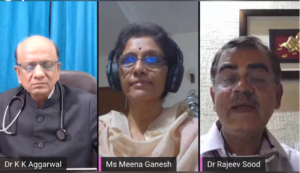Home isolation can come as an ideal solution for Covid-19. Home and community support will be pillars of recovery as the pandemic has put significant pressure on traditional healthcare resources and in mild and asymptomatic cases.


Speaking about this, Padma Shri Awardee Dr KK Aggarwal, President Heart Care Foundation of India (HCFI) & Confederation of Medical Associations of Asia & Oceania (CMAAO), Editor-in-Chief Medtalks & IJCP Group said, “Given the current crisis and the burden on traditional healthcare settings, home care is emerging as the answer. New learnings have shown how the cohort treatment is very effective. This could include getting set of Covid-positive patients together to support each other and enable recovery. Those with Covid or Covid-like symptoms should not get upset or panic. Recovery is the rule and fatality is an exception. It is important to isolate at home and follow guidelines. After the 9th/10th day, the virus becomes non-replicable and non-virulent. After the 10th day, the person can be shifted to quarantine and after 14th day, to monitoring. All that is needed is an oximeter and oxygen concentrator at home. The third to sixth days are the most important. If patients develop exertional hypoxia, medicines, steroid, anti-viral medicines can be administered for treatment and ventilation can be avoided. If the condition deteriorates, hospitalisation may be needed but only in very few cases. After the sixth day, only home care is advised and is safe.
Also Read: COVID-19 STAYS IN BODY FOR 9 DAYS ONLY, NO NEED TO GET SCARED.
Adding further, Meena Ganesh, MD & Founder Portea Medical said, “Community care is the need of the hour and can help in reducing the burden on hospital beds significantly. This is evident from Portea’s experience of handling 45,000 COVID positive patients with home isolation solutions and less than 3% of them needing hospitalisation. The remaining people recover completely at home. Our program involves daily, constant monitoring by healthcare workers, teleconsultation with a doctor, tracking the vitals, speaking with the patient and family member, and access to a 24 X 7 helpline.
Adding further she said-“Community care has two key roles to play: informing and educating people on handling the crisis and ensuring preparedness to avoid panic and act decisively and calmly. The shift from hospital-centric care to home-based care will drive better outcomes, convenient access for the patients, lower cost of healthcare, and better utilization of doctors and hospital resources. The success in handling home isolation of COVID patients will now pave the way for handling infectious diseases and chronic diseases through technology, remote monitoring, and community support. Healthcare will transform to the betterment of all sections – the patients, the doctors, hospitals & service providers with community care based models taking center stage”


The underlying message conveyed during the panel discussion centered around how family and community are important aspects of recovery from Covid-19. Avoiding panic and following precautions emerged as the key takeaway messages as also the importance of coming back to the family and home environment.













